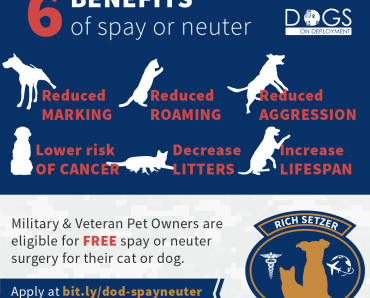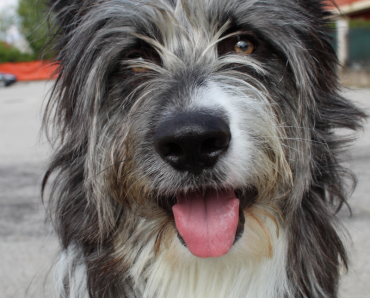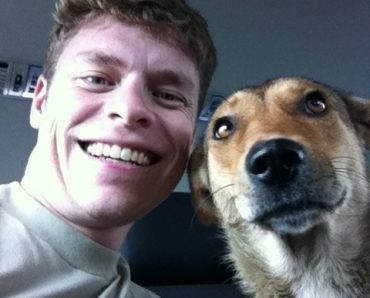By Doug Williams
Reposted from U-T San Diego

When veteran Thomas Frank (far left) needed medical care, his beloved Zoe Jane was taken care of by Eamun and Lauren Rahimi. — K.C. Alfred / U-T San Diego
Two years ago, Alisa and Shawn Johnson were driving from their home in San Diego to Quantico, Va., in Alisa’s baby-blue convertible filled with her belongings and their miniature Australian shepherd, J.D.
Alisa was on her way to the Marine Corps Basic School at Quantico, and her husband, a Navy helicopter pilot, was soon to be deployed overseas. Because J.D. couldn’t go with either, they’d found a temporary home for him with one of Alisa’s relatives back east.
But as they drove, they talked about their situation. What if a relative hadn’t stepped forward? What are men and women in the military supposed to do with their beloved animals if they’re deployed and don’t have the support of family or friends?
“We have the financial ability to board for long term if needed,†says Alisa Johnson, a pilot and first lieutenant in the Marine Corps who met her husband at USD. “We’re two officers, and we don’t have kids. Now you take a young enlisted person who has a wife who doesn’t work and two babies and they have a dog, they can’t afford that kind of care.â€
That’s when the Johnsons came up with the idea for Dogs on Deployment, an organization that pairs service members in need of foster homes for their pets with families willing to help.
They set up a website in 2011 and Dogs on Deployment became an officially licensed nonprofit last year. It has helped about 315 military personnel across the U.S. find temporary homes for their pets. Traffic to the site has taken off this year — the Johnsons’ appearance on “The Queen Latifah Show†in September helped — and nearly 6,000 people have registered to serve as fosters. Several volunteers in San Diego help run the site.
Service members go to the site (dogsondeployment.org), create an account and provide information about their situation. Once their military status is verified, they can browse the volunteers’ profiles and find a good fit.
“We are not a foster service,†says Johnson. “We are a network. So you can kind of think of it as like a dating site for military pets.â€
Johnson says the organization is meant to be a last resort.
“We don’t want to promote people going and getting pets when they don’t have a primary (care) plan in place,†she says.
But, she said, things happen. People get divorced, families and friends move away and military members are left looking for a place for their dog, cat, parrot or rabbit.
That was the situation Thomas Frank was in this year.
Frank, 40, was in the Army’s 82nd Airborne Division in the mid 1990s and served in Bosnia and Somalia. He left the Army in 1995 but for years has dealt with the trauma of being on a plane that crashed in a 1994 training accident. Twenty-four soldiers died that day. At times, he says he hasn’t been able to function.
This year, Frank had the opportunity to undergo treatment for post-traumatic stress disorder at the Veterans Village of San Diego. But that treatment would require him to stay at the facility about three months — and he wouldn’t be able to take his little Jack Russell/Chihuahua mix, Zoe Jane.
To Frank, Zoe Jane is his family and “the most awesomest dog in the world.â€
“It was either me going to treatment with somebody watching my dog, or me not going to treatment,†he says. “I didn’t want to leave my dog.â€
One of the therapists at Veterans Village told Frank about Dogs on Deployment. As an honorably discharged veteran receiving treatment for a condition related to his military service, Frank was eligible.
He signed up and talked with several families until he found Lauren and Eamun Rahimi of San Diego. Instantly, he felt they were the ones to take care of Zoe Jane.
“I’m not going to put my dog with (just) anybody, and these people that I found are fantastic,†says Frank. “They’re out of this world.â€
Soon, Zoe Jane became a fixture in the Rahimi household, which already included a Chihuahua named Pepper and a toddler. Lauren, who was pregnant at the time, joked with Frank they’d make a nice home for his dog because they were “landlocked†while awaiting the baby.
But really, says Lauren, it wasn’t difficult. Plus, it was a chance to help. Lauren says she’s seen friends in the military cope with being on their own.
“I kind of see the struggles they go through and I thought, ‘Well, if they have dogs that need watching, it seems like an easy way to help out,’ †she says.
Pepper and Zoe Jane were “like sisters,†she says, and her young son spent most of his time hugging his new friend. On weekends, they’d even take Zoe Jane to see Frank.
Their care gave Frank the peace of mind to get the treatment he needed.
Now, he’s back living on his own with Zoe Jane and going to school and grateful for what Dogs on Deployment made possible.
“Because without that dog, I don’t know where I’d be,†says Frank. “I don’t care how much treatment I go through, without that dog, I don’t know where I’d be. She’s just my world. She knows everything about me.â€

Thomas Frank, Zoe Jane, with temporary dog foster family Eamun Rahimi, holding son Michael, and Lauren Rahimi with their baby, Carter. — K.C. Alfred / U-T San Diego
It’s the type of story that makes Alisa and Shawn Johnson smile. Recently, they also heard from the wife of a soldier who had been critically injured in Afghanistan and needed to spend time at Walter Reed National Military Medical Center in Washington, D.C. His whole family wanted to be there, too, to help with his recovery, but they needed to find someone to take care of their dog.
“We were able to help them,†says Alisa Johnson. “We got, ‘Thanks so much for helping me find someplace for my dog so I can be with my husband during this difficult time.’ Words can’t describe how good that makes you feel.â€




